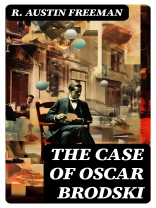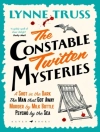R. Austin Freeman’s ‘The Case of Oscar Brodski’ is a masterful work within the detective fiction genre that brilliantly utilize the scientific methods of forensic investigation, a hallmark of Freeman’s literary style. Set against the backdrop of early 20th-century England, this narrative employs a tight, logical structure woven with meticulous detail, presenting a classic detective mystery that engages readers while exploring themes of justice, morality, and the fallibility of human perception. Freeman’s use of the rationalist approach, particularly through the character of Dr. John Thorndyke—one of the first fictional detectives to utilize forensic science—elevates the narrative beyond mere entertainment to a commentary on the evolving methodologies of crime-solving in a rapidly modernizing society. R. Austin Freeman, a contemporary of Arthur Conan Doyle, was not only a prolific author but also a trained physician, which heavily influenced his portrayal of forensic science in his works. Freeman’s background in medicine provided him with unique insights into the criminal mind and investigative processes, allowing him to imbue his stories with authenticity and a keen sense of realism. His experiences during the early 1900s, amidst burgeoning forensic advancements, inspired his innovative merging of scientific principles with fiction. ‘The Case of Oscar Brodski’ is highly recommended for readers who appreciate a blend of intellectual rigor and thrilling narrative. Fans of Sherlock Holmes will find Thorndyke to be a worthy counterpart, embodying the analytical prowess and moral complexity that characterize the best detective literature. This novel is a notable achievement that showcases Freeman’s deft storytelling and offers profound insights into the nature of crime and human behavior.
关于作者
R. Austin Freeman (1862-1943) was an influential British writer of detective stories, most famous for his creation of the character Dr. John Thorndyke, a medical jurisprudence expert who applies scientific methods to solve crimes. Born in London, Freeman pursued a career in medicine, a background that lent authenticity to his intricately plotted mysteries. His writing career flourished during the early 20th century, a time when detective fiction was rapidly gaining popularity. ‘The Case of Oscar Brodski’ is one of many stories featuring Dr. Thorndyke and exhibits Freeman’s pioneering use of the ‘inverted detective story’ format, where the method and perpetrator are revealed upfront, and the narrative follows the investigator’s path to the same conclusion. This technique displayed Freeman’s ingenuity and allowed him to focus on the forensic science aspects of detection, an angle that distinguished his work from contemporaries. Freeman’s legacy lies not only in his narrative innovation but in his meticulous attention to scientific accuracy and logical deduction, solidifying his place in the pantheon of classic detective fiction authors. His works are seen as a critical bridge between Edgar Allan Poe’s pioneering detective stories and the Golden Age of Detective Fiction epitomized by Agatha Christie and Dorothy L. Sayers.












